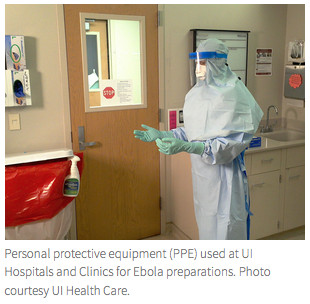The College of Engineering will play a supportive role, along with other colleges and units, as the University of Iowa has been named one of six U.S.

The UI team, led by Eli Perencevich, professor of internal medicine, will receive $2.2 million over three years from the CDC to develop and test interventions to prevent dangerous pathogens like Ebola, MRSA, and Clostridium difficile from spreading in hospitals.
The CDC will award a total of $11 million to the six new Prevention Epicenters, which are based at Emory University, Johns Hopkins University, University of Illinois at Chicago, University of Maryland, Baltimore, and University of Utah, in addition to the UI. The new funding more than doubles the number of CDC Prevention Epicenters, with the new centers joining five existing American Epicenters working to discover new ways to protect patients from dangerous germs.
UI researchers from the Carver College of Medicine, College of Liberal Arts and Sciences, College of Engineering, and the College of Public Health, as well as the Iowa City Veterans Affairs Health Care System, will tackle four specific projects. The teams will test a variety of approaches, ranging from high-tech to low-tech interventions, to prevent the spread of infectious germs in patient care settings; track health care workers’ compliance with wearing personal protective equipment (PPE); and improve protocols for putting on and taking off complicated PPE of the type required to care for Ebola patients. One group also will generate a more quantitative picture of the true benefits of PPE, as well as evidence of any harms associated with the equipment.
In addition to Perencevich, the UI project co-investigators are Loreen Herwaldt, Philip Polgreen, Marin Schweizer, and Daniel Diekema.
Through individual research projects and collaborative efforts, the six new Prevention Epicenters will focus on identifying innovations to better protect health care workers and patients from dangerous infectious diseases that can spread in health care settings. In addition to collaboration between the Prevention Epicenters, Perencevich notes that several of the UI projects also involve collaboration with partner hospitals and academic centers in Wisconsin and Nebraska.